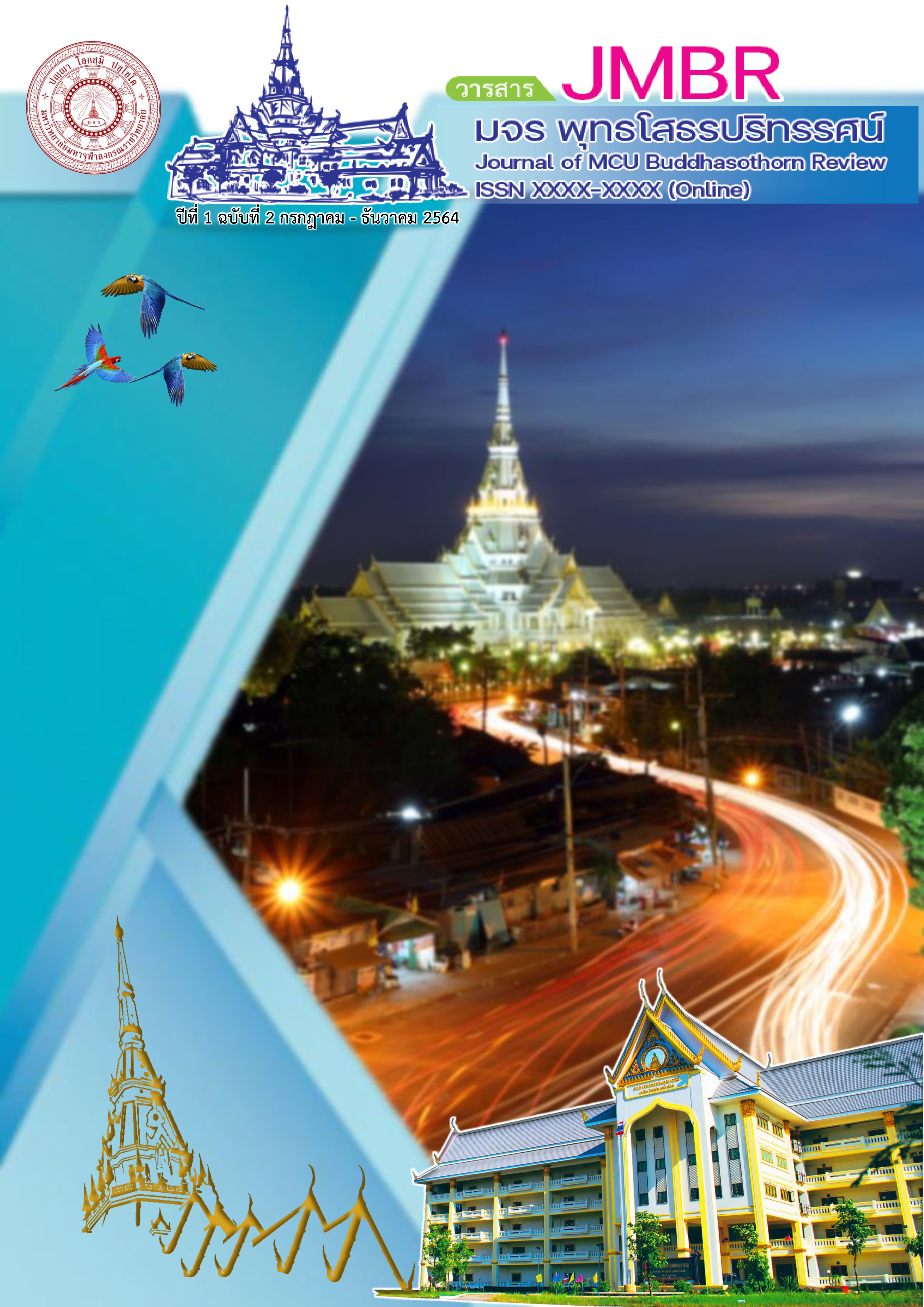STRATEGIES FOR KNOWLEDGE MANAGEMENT ACCORDING TO BUDDHIST METHODS IN THE 21ST CENTURY
Main Article Content
Abstract
Abstract
Buddhist knowledge management strategies in the 21st century must be linked to social processes. The inevitable economic system and must be consistent with the advancement in science and technology and changes in all aspects that are continually fast The traditional education system that focuses on knowledge cannot develop people with quality surroundings. This academic article aims to study 1) Education management and learning management 2) Study the concept of knowledge management 3) Strategies for managing knowledge using Buddhist methods in the 21st century Knowledge management therefore inevitably changes people with the knowledge and skills to cope with the constant change. And only able to adapt to new situations will experience. Therefore, learning management needs to be adjusted. And there must be development of teachers and learners to keep up with the changes of the world in the future. in Buddhism Lord Buddha, he has established a Buddhism Organization After the Buddha attained enlightenment, he preached a sermon until the people believed and joined the Buddhist organization. The Buddha managed knowledge by giving concepts and principles of teachings to promote the management of personnel of the Sangha. To be stable and sustained for a long time until today Moreover, it can be counted that the knowledge management of the Buddhist Organization is the management of the Organization of Learning, the Organization of Education.
Article Details
ต้นฉบับที่ได้รับการตีพิมพ์ในวารสาร มจร พุทธโสธรปริทรรศน์ วิทยาลัยสงฆ์พุทธโสธร มหาวิทยาลัยมหาจุฬาลงกรณราชวิทยาลัย ถือเป็นกรรมสิทธิ์ของวิทยาลัยสงฆ์พุทธโสธร มหาวิทยาลัยมหาจุฬาลงกรณราชวิทยาลัย ห้ามนำข้อความทั้งหมดหรือบางส่วนไปพิมพ์ซ้ำ เว้นเสีย แต่ว่าจะได้รับอนุญาตจากวิทยาลัยฯ เป็นลายลักษณ์อักษร และเพื่อให้เป็นไปตามกฎหมายลิขสิทธิ์ ผู้เขียนทุกท่านต้องลงลายมือชื่อในแบบฟอร์มใบมอบลิขสิทธิ์ บทความให้แก่วารสาร พร้อมกับบทความต้นฉบับที่ได้แก้ไขครั้งสุดท้าย นอกจากนี้ ผู้เขียนทุกท่านต้องยืนยันว่าบทความต้นฉบับที่ส่งมาตีพิมพ์นั้น ได้ส่งมาตีพิมพ์เฉพาะในวารสาร มจร พุทธโสธรปริทรรศน์ เพียงแห่งเดียวเท่านั้น
References
ทิพวรรณ หล่อสุวรรณรัตน์. (2552).องค์การแห่งความรู้: จากแนวคิดสู่การปฏิบัติ. พิมพ์ครั้งที่ 5. กรุงเทพมหานคร : สำนักพิมพ์รัตนไตร.
ทิศนา แขมณี. (2555). บัณฑิตศึกษาในศตวรรษที่ 21: การปรับหลักสูตรและการสอน. เอกสารอัดสำเนา.
ประเวศ วะสี. (2546). วิถีมนุษย์ในศตวรรษที่ 21 สู่ภพภูมิใหม่แห่งการพัฒนา. วารสารหมออนามัย. 12 (4), 7 21.
พระธรรมโกศาจารย์ (ประยูร ธมฺมจิตฺโต).(2553). ปัญญาต้องคู่กับกรุณาจึงจะพาชาติรอด. กรุงเทพมหานคร : โรงพิมพ์มหาจุฬาลงกรณราชวิทยาลัย.
พระธรรมปิฎก (ป.อ. ปยุตฺโต). (2544). พุทธวิธีในการสอน. (พิมพ์ครั้งที่ 8). กรุงเทพฯ : สหธรรมิก. (2540). พระพุทธศาสนาพัฒนาคนและสังคม. กรุงเทพฯ : โรงพิมพ์ส่วนท้องถิ่น.
พระมหาบุญมี มาลาวชิโร.(2553). พุทธบริหาร สู่สุดยอดนักบริหารผู้ทรงภูมิที่ลูกน้องรักและเทิดทูนอย่างจริงจัง. กรุงเทพมหานคร : บริษัท ธิงค์ บิยอนด์บุ๊คส์ จำกัด.
มหาจุฬาลงกรณราชวิทยาลัย. (2539). พระไตรปิฎกภาษาไทยฉบับมหาจุฬาลงกรณราชวิทยาลัย. กรุงเทพฯ : มหาจุฬาลงกรณราชวิทยาลัย.
ยุทธนา แซ่เตียว.(2547). การจัดการความรู้สร้างองค์การอัจฉริยะ. กรุงเทพมหานคร : ซีเอ็ดคูเอชั่น.
ราชบัณฑิตสถาน.(2548). พจนานุกรมศัพท์ปรัชญาอังกฤษ-ไทยฉบับราชบัณฑิตยสถานพ.ศ. ๒๕๔๘, พิมพ์ครั้งที่ 4. กรุงเทพมหานคร : นานมีบุ๊คส์พับลิเคชั่นส์.
วิจารณ์ พานิช. (2551). การจัดการความรู้ ฉบับนักปฏิบัติ. ตถาตา พับลิเคชั่น จำกัด. กรุงเทพมหานคร.
วิชัย ตันศิริ. (2547). โฉมหน้าการศึกษาไทยในอนาคต : แนวคิดสู่การปฏิรูปในพระราชบัญญัติการศึกษา. พิมพ์ครั้งที่ 4. กรุงเทพมหานคร : สำนักพิมพ์แห่งจุฬาลงกรณ์มหาวิทยาลัย.
สุคนธ์ สินธพานนท์. (2558). การจัดการเรียนรู้ของครูยุคใหม่ เพื่อพัฒนาทักษะผู้เรียนในศตวรรษที่ 21. กรุงเทพมหานคร : ห้างหุ้นส่วนจำกัด 9119 เทคนิคพพริ้นติ้ง.
สุชีพ ปุญญานุภาพ. (2533). คุณลักษณะพิเศษแห่งพระพุทธศาสนา. กรุงเทพมหานคร : : โรงพิมพ์มหามกุฏราชวิทยาลัย
สถาบันเพิ่มผลผลิตแห่งชาติ. (2548). การจัดการความรู้จากทฤษฎีสู่การปฏิบัติ. กรุงเทพมหานคร : จิรวัฒน์เอ็กซ์เพรส.


